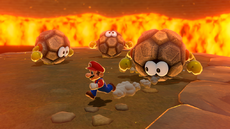Brolder
Template:Species-infobox Brolders are boulder enemies first appearing in Super Mario 3D World. They appear to be boulders with eyes and yellow arms. They are only found in lava-filled levels. Their leader is Boss Brolder.
Rather than being visible at all times, Brolders hide underground until they are approached, at which point they will emerge from the ground. Brolders' only method of attack is rolling in the character's direction to harm them. However, when they are hit by an attack or tapped on the GamePad, they temporarily become common boulders with no eyes or arms. In this state, they can be picked up and carried by the player, then tossed in a preferred spot. In a section of Mystery House Marathon, Brolders must be placed onto switches to keep them simultaneously pressed, granting a Green Star. Brolders can be defeated by being tossed into the lava or by having another Brolder tossed at them.
If a Brolder is not attacked periodically while in its boulder state, it will start to rumble and eventually turn back to normal, beginning to roll towards the player again. If a player is holding a Brolder when this happens, they will take damage before dropping them.
Brolders also appear on the mountainous Ridgerock Lake course in Mario Golf: Super Rush.[1]
Gallery
Brolders populating Ridgerock Lake in Mario Golf: Super Rush
Names in other languages
| Language | Name | Meaning | Notes |
|---|---|---|---|
| Japanese | ゴロボン[?] Gorobon |
From 「ゴロゴロ」gorogoro, onomatopoeia for rolling, and「坊」(bon), an affectionate term for boys; similar to Mrs. Thwomp | |
| Chinese (simplified) | 滚动岩[?] Gǔndòng Yán |
Rolling Rock | |
| German | Karumpel[?] | - | |
| Italian | Ruzzolo[?] | ? | |
| Korean | 데굴락[?] Daegul lock |
From "데굴데굴"(onomatopoeia for rolling) and rock | |
| Portuguese | Rebolocha[?] | from rebolar (roll) and rocha (rock) | |
| Russian | Булиган[?] Buligan |
From Булыжник (Cobblestone) and Хулиган (Hooligan) | |
| Spanish (NOA) | Rocoloco[?] | From roca (rock) and loco (crazy) | |
| Spanish (NOE) | Rocorrodón[?] | From roca (rock) and rodar (roll) |

